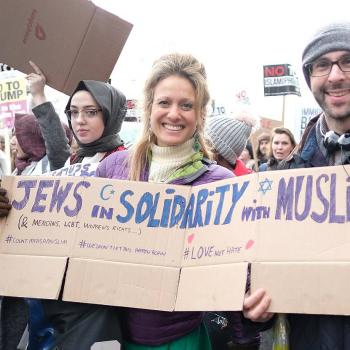 |
|
Nature or nurture?
|
Six years ago, I left the country where I was born and arrived in Britain with an intent to settle with my new wife. I flew into Heathrow on a one way ticket – with no visa – and yet was allowed into the country with no difficulty, even though I was a Muslim immigrant arriving just over two years after 9/11. I was offered a job within two weeks, paid by a British company directly into a bank account back home while I sorted out my residency. When I did so a few months later, I was told it would take up to four weeks. It took 24 hours.
This would normally be the type of story that drives Daily Mail readers mad, except for the one factor that trumps all others when it comes to personal identity, socio-economics, and religious practice. I’m an American.
This week, a Gallup poll confirmed what many other studies – particularly their own indispensable “Who Speaks for Islam? What a Billion Muslims Really Think” – have shown about American Muslims. They are among America’s brightest and well adjusted minorities. Forty three percent of American Muslim women hold a college or post-graduate degree, compared with 29% of American women overall. These women make as much as their male counterparts – with less inequality than any other religious group or America as a whole.
Added to those findings was a greater sense by American Muslims that they were “thriving” (41% vs. 46% for Americans overall), dwarfing – with the exception of Saudi Arabia – the world’s Muslim countries (Morocco’s 24% is the next down the list). For Britain, this figure drops to 7%, well below the 17% and 11% of co-religionists in Bangladesh and Pakistan respectively.
For years, the US government has picked up on findings such as these, touting their well integrated Muslims to the rest of the world. But polls numbers like these, useful and important as they are, cloud issues of culture, class, and immigration that are more relevant. Poll averages hide disparities between working class African-American Muslims and immigrant professionals. And the strong emphasis on immigration in the British debate, with a focus on language, ghettos, and unfamiliar customs, does not translate well in America. If Mexico was a Muslim country, things would sound a lot more familiar.
It’s easy to jump on Britain’s 7% figure and extrapolate many unsavory things about British Muslim life. Yet the sense of tension here, even compared to post-9/11 America, is palpable. At the risk of echoing Barack Obama’s worst campaign gaffe, people may cling to religion, culture, and the proximity of their families in these circumstances. Even then, British Muslims have thrived in demonstrable ways – in literature, music, politics, and business. How one feels about “thriving” (as the figures from Bangladesh show) is relative. I feel I’m thriving here, too.
We must admit that the American model of integration, strong as it is, benefits from a generous helping of good fortune. No ethnic group dominates among American Muslims, who are roughly divided into Arabs, African-Americans, and South Asians in equal numbers. For those that immigrated, the doors were open primarily to the professional and academic (student) classes – essentially pre-Westernized and pre-assimilated. This allowed American Muslims to strip the cultural crust from Islamic practice more effectively than in any other country. Conventional attitudes towards gender roles, ritual practice, and participation in wider society are harder to enforce, allowing an American Muslim identity to form more rapidly. Muslims have found American culture seductive, accessible, and largely compatible with the Islam they now practice, an Islam that still retains a strong scholarly tradition. And much as we want it to be, this is not by design. It just is.
There is a tendency to view Muslim communities only in terms of policy decisions, with little regard to cultures (of both hosts and immigrants), economics, and class. Instead the debate in Britain revolves only around religion. Not all the successes and failures in Britain and America can be tied to religion alone. Blaming clerics is too simplistic. The individuals who thrive in Britain do so, as I see it, outside of the traditional Muslim structures and institutions that have been set up here. That is a very American way of going about things, and the clean slate that American Muslims had in the first place.
When America brought in educated Muslim immigrants (along with Pilipino, Korean, Chinese, and others) in the 50s and 60s to study and work, it was not the result of a policy decision to prevent extremism. It was merely a response to an economic need. Similarly, there was no grand scheme back then to engineer the diversity of American Muslims that now exists – a diversity that, along with the past evolution of America as a haven for immigrants, has largely stripped culture from Americas Islamic debate.
But all of this might still be beside the point. For the past three years, I’ve worked as a project manager of a large development in Bradford’s city centre, where I was the only Asian face among scores of people on the construction site. When my expected Yorkshire accent turned out American, I was often pulled aside by colleagues who extolled the virtues of my culture (that would be the American one, not the Asian one). Similarly, among the Muslims in Bradford I meet, I am rarely asked about Muslim life in America. Instead, I’m asked about American life in general – shopping, sports, cars, and big houses.
American Muslims may indeed be thriving more than their counterparts abroad. But this may say more about a deference to America, its culture, its economy, and just plain luck than about any intentional American policy or program to fashion a better Muslim.
(Photo: Lauri Lyons via flickr under a Creative Commons license. A version of this article previously appeared in the Guardian’s Comment is Free)
Zahed Amanullah is associate editor of altmuslim.com. He is based in London, England.















